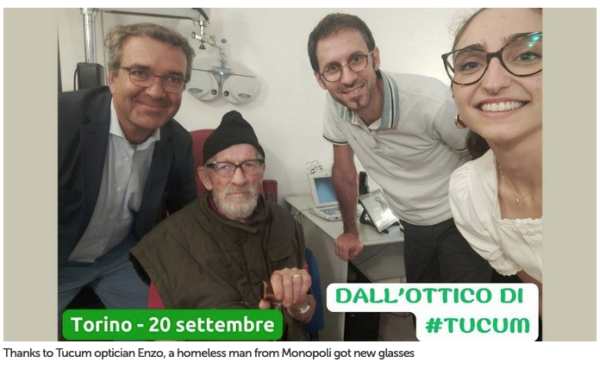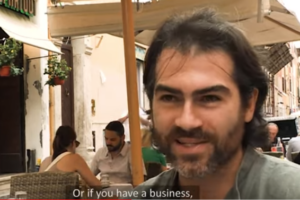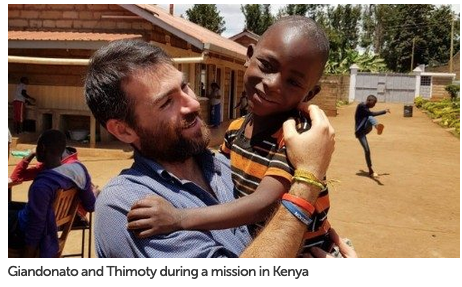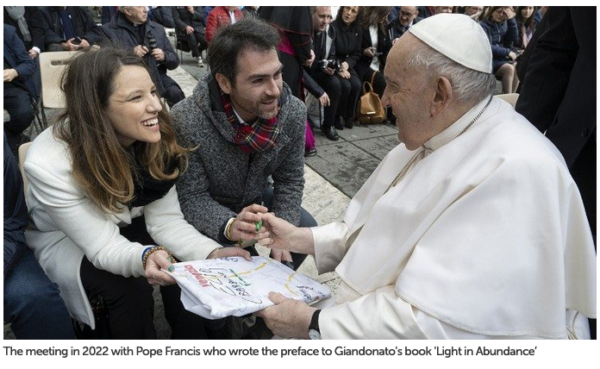Giandonato Salvia leveraged his economics degree and passion for helping others to create Tucum, a “suspended economy” app that offers services and goods of various kinds to the poorest people…his family background and his thinking INSPIRES…
________________________________________________________________
“Our real target,” Salvio says, “is the poor and it is for them that we want to become advocates of change. Those who donate are never impoverished. And being channels for material goods means recognizing ourselves as custodians, not owners, of what is given to us.”
________________________________________________________________
VaticanNews— Giandonato Salvia is the protagonist of this story, in which we recount the birth and use of Tucum, a “suspended economy” App that offers services and goods of various kinds to the poorest people.
“Looking at the catastrophic madness of the globalized world, I thought of an effective and targeted response to restore an economy that does not only look at profit, and I found this response in the Gospel,” says Tucum founder Giandonato Salvia.
For Salvia, two things inspired this project: Recently beatified young Carlo Acutis and Pope Francis’ Laudato si’.
Family
“My father is a doctor. Every year, when I was younger, I would see him leave for Africa to offer free treatment in very poor places with the non-profit organization Solidarietà missionaria, which has supported more than 800 projects in 39 countries around the world since 1984.
“My mother, on the other hand, dedicated herself to her family and was always ready to welcome home the missionaries who passed through Italy.”
Missionary Trips opened his eyes… and his heart
“When I was 17,” Salvia continues, “I decided to go with my father to Guinea-Bissau. There I saw poverty. The kind that is easy to recognize, linked to malnutrition, hunger, corruption.
“I saw the swollen bellies of hungry children, I saw the suffering eyes of women who do not know how to feed their children, and I understood that I could and should do something. I thought that if my father healed the wounds of the body, I could commit myself to healing other wounds, those caused by social injustice.”
This first trip was followed by many others—to the Democratic Republic of Congo, Liberia, Mozambique, Tanzania and then to Brazil, Ecuador and Bulgaria.
Launching the Tucum App
Giandonato Salvia, 33, originally from Monopoli, Italy, graduated college with a degree in “Economics of Financial Intermediaries and Markets.” He is the creator, along with his brother Pierluca, an engineer, of Tucum, the “suspended economy” App that speaks the language of fraternity and evangelical love.
The mission of caring
“The name of the application,” explains Giandonato, “originates from this coconut ring I wear, which comes from Brazil and has a very deep meaning. It was in fact used by Christians, Catholic and non, as a symbol of the bond between the Church and the poor, and also as a symbol of fraternity.
“During my time in Africa I felt deep down what it means to be a brother to a man, a woman, a child with whom you share no blood but for whom you are willing to take the food out of your own mouth to feed theirs. So I thought of declining this concept in a systemic and IT context”.
A Neapolitan tradition: The Concept behind Tucum App
The concept behind the App is actually not very different from that of the ‘suspended coffee’ that originates from the Neapolitan tradition: buying a coffee and leaving it, paid for, for those who will come later.
It is one of the gestures that is mostly used as a sign of kindness and sharing. It is a simple way to take care of another person. When the recipient of one’s offer is unknown, as happens with the ‘suspended coffee’ tradition, this gesture takes on an even deeper meaning.
Tucum broadens the horizon, transferring the principles of giving and sharing to all goods and services on the market (www.tucum.it), be it a medicine, a doctor’s appointment, a new pair of glasses, a haircut at the hairdresser’s, or food.
You can donate money to less well-off families, you can register in the ‘free’ section as a shopkeeper or service manager, or if you are an entrepreneur, you can even offer employment, a job to someone who does not have one.
“All this,” says Giandonato, “is based on the concept of ‘suspended‘, that is, I don’t know you, I don’t know who you are, where you live, but I am thinking of you and your needs.
“As an economist, looking at the catastrophic madness of the globalized world, I thought of an effective and targeted response to restore an economy that does not only look at profit. Even though it may seem a bit at odds with my studies, numbers, graphs, statistics, I found this response only in the Gospel.”
Economy, Gospel, Technology
Giandonato’s inspiration comes from Carlo Acutis, so much so that in 2018, along with his brother Pierluca, he started the social enterprise A.P.P Acutis precisely to pay homage to the young beatified man who made the love of God and service to the poorest, as well as the formidable use of information technology, his life program..
But in this project, there is also much of the encyclicals Fratelli tutti and Laudato si’.
“Laudato si’,” continues Giandonato, “speaks not only to ecologists or those who live an environmental vocation on the front line but to everyone, even to us economists: integral ecology has in fact the basic idea of bringing the whole community together and stimulating it to cooperate.
Echo of Saint Francis
“St Francis had a universal heart, he embraced man and wolf, Creation and its creatures in intimate union, and if there is this intimate union, our behavior becomes spontaneous towards everyone and everything.
“Tucum is a spontaneous response that I gave to life and to God, with my studies, with the mission in Africa and South America. With Tucum we want to do this, to reach the ‘black holes’ as Mother Teresa of Calcutta called them, the poor among the poor, and allow them to be accompanied, defended and supported by a community. Those who register in Tucum receive a card and with that they go to shops and affiliated businesses and spend what others have donated for a need.. a necessity.”
How Tucum works
Tucum connects citizens, businesses, freelancers and Third Sector organizations such as associations, parishes and Caritas.
Through the App, it is possible to donate to the organizations associated with the project, to support the neediest families they look after, and at the same time to enhance the small businesses in an area. 
The organizations, assign NFC technology cards to the beneficiary families which contain credits that can be used at any business registered on the Tucum app, such as pharmacies, clothing shops, grocery shops, self-employed professionals and more.
The beneficiary can thus go directly to the businesses and choose the products and services he or she needs with greater discretion and dignity.
At the same time, the participating businesses are supported in their work and can participate more actively in the project by applying discounts and being able to follow the beneficiaries more closely during their purchases.
Imbedded Safeguards
Thanks to the technology used, in order to counter any abuse, the shopkeeper is able to verify the identity of the beneficiary by comparing the photo recorded in the chip of the card each time it is used.
The beneficiary families are in turn called upon to become a support for other families by paying a small monthly contribution of 2euros as a sign of responsibility and participation in the project.
Stories of everyday life
There are many anecdotes that Giandonato tells us and at times he is moved.
Shopkeeper in Brindisi
One concerns a shopkeeper in Brindisi who took in a young girl with a Tucum card.
“She entered the place with some shyness, almost shame,'” explains Giandonato, “and said she wanted to use that money not for herself but to give a birthday present to a friend of hers. To the shop owner she said: ‘I never go to birthdays because I don’t like to turn up empty-handed. My father lost his job, we struggle at home even to eat. But this time I took courage and wanted to go to this party and I could only do it thanks to the generosity of the Tucum donors.”
We are also very interested in this aspect, in being able to make someone feel welcomed by society. Someone who otherwise, for lack of means, would feel left out.
Enzo, homeless and 85 years old
Another wonderful story concerns Enzo, whom we met during a stage of the Via Lucis, this human and pastoral support that we do with the diocese and which takes us to meet the poorest people in stations in big cities. 
Enzo is homeless, when I met him in Brindisi he had his hands in the rubbish bin, he was rummaging for scraps of food or something he could use. I started talking to him and found out that two days later he would be turning 85 years old. I proposed that we celebrate it together and he was very happy.
We brought things to drink, to eat in this small room of two by three meters that he calls home, leaning on one side he had a pair of broken glasses, tied with duct tape. We told him that in Tucum we had an optician hanging around and we could fix his glasses. Enzo was overjoyed, so we took him in, he had an eye examination and got his new glasses.
The Tucum spirit
This is really the spirit of Tucum. To serve others by giving them dignity, refreshment.
On the other hand, Jesus says: whatever you do to one of these little ones, you have done to me, and through these people we really touch the flesh of Christ, behind every poor person is the face of Jesus.
Salvio Awarded a Knight of the Order of Merit of the Italian Republic
In November 2022, Giandonato received the honour of Cavaliere dell’Ordine al Merito della Repubblica Italiana (Knight of the Order of Merit of the Italian Republic) from the President of the Italian Republic, Sergio Mattarella, ‘for contributing to the social use of new technologies’.
This recognition, as well as the honor of having Pope Francis write the preface to his book “Light in Abundance” were a caress for Giandonato, who is convinced, however, that true good is done and must be done not because someone rewards you:
“Our real target,” Salvio says, “is the poor and it is for them that we want to become advocates of change. Those who donate are never impoverished. And being channels for material goods means recognizing ourselves as custodians, not owners, of what is given to us.”






You must be logged in to post a comment.